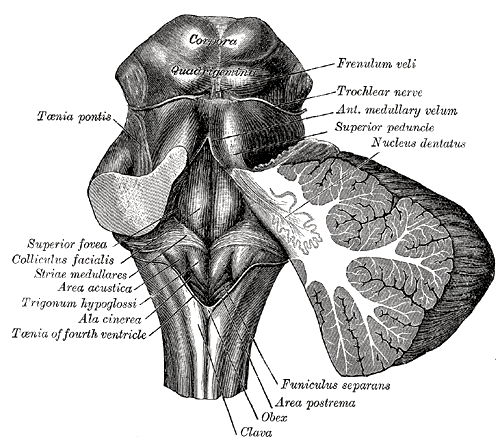‘Ground Zero’ Of Alzheimer’s: Locus Coeruleus Identified As Critical Starting Point Of Disease

A region in the brain called the locus coeruleus, which produces nerepinephrine, may play a crucial role in the development (and potential prevention) of Alzheimer’s, a new study finds. The study, conducted by researchers at the University of Southern California, dubs this brain region as the “ground zero” of Alzheimer’s disease.
The locus coerleus is small, but it’s interconnected with a lot of the body’s processes — including the circulatory and cardiovascular systems, attention, memory, cognitive function, and identifying novel information. It’s also involved in the physiological responses to stress and anxiety, and its main function is producing norepinephrine, which plays a role as both a neurotransmitter and hormone during the fight-or-flight response to stress. Norepinephrine can impact heart rate, glucose release, and blood flow as it’s pushed from the locus coerleus to the spinal cord, cerebral cortex, and limbic system.

It’s the locus coerleus that is likely to show tau protein in its beginning stages, appearing as early as young adulthood. A buildup of tau protein in tangles is a symptom of Alzheimer’s disease, and the study found that this initially starts in the locus coerleus.
The locus coerleus is also damaged from lack of sleep, recent studies have shown. Not sleeping enough harms neurons in the locus coerleus; it makes sense, then, that researchers have linked a lack of deep sleep to a brain more vulnerable to Alzheimer’s disease.
Scientists have known for years that the locus coerleus (LC) is involved in the development of Alzheimer’s, but until now it wasn't certain whether the LC was where it all started. The latest study also touches on the link between norepinephrine and degeneration; past research done in rats and mice showed that norepinephrine may actually prevent Alzheimer’s symptoms. During Alzheimer’s, as the locus coerleus decreases, so does the amount of norepinephrine being produced. As a result, an increase in the neurotransmitter may help protect neurons from Alzheimer’s-related degeneration and inflammation.
According to Mara Mather, lead author of the most recent study, production of norepinephrine is triggered with someone is mentally engaged or challenged by an intellectual activity — anything from reading a book, doing a word puzzle, or tackling a difficult problem-solving or musical task. Keeping your mind and body active throughout life — especially during older years — may help slow the progression of Alzheimer’s disease.
“Education and engaging careers produce late-life ‘cognitive reserve,’ or effective brain performance, despite encroaching pathology,” Mather said in the press release. “Activation of the locus coeruleus-norepinephrine system by novelty and mental challenge throughout one’s life may contribute to cognitive reserve.”
Source: Mather M, et al. The Locus Coeruleus: Essential for Maintaining Cognitive Function and the Aging Brain. Trends in Cognitive Sciences, 2016.
Published by Medicaldaily.com



























